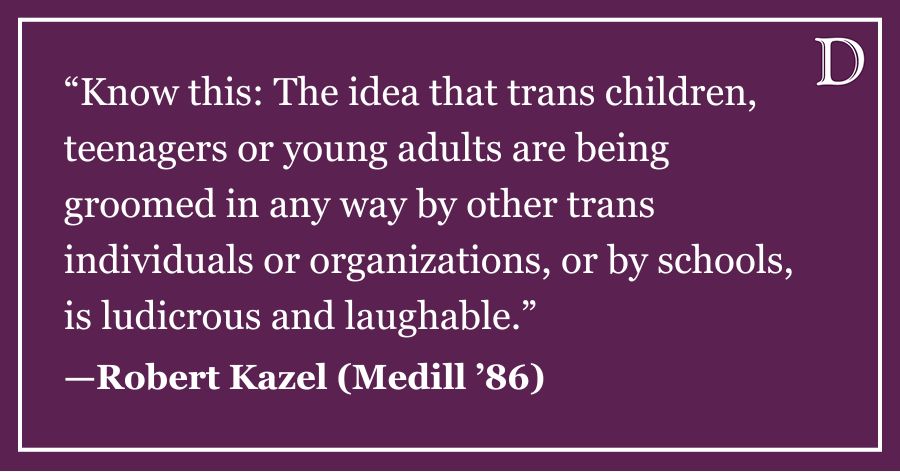As a transfer student living in the dorms this year, I have yet to deal with the housing regulations of Evanston on a personal level. From what I have seen and heard, though, they may very well be the most archaic, non-functioning group of rules that a town could have. I am referring specifically to the colloquially know “brothel law,” a longstanding Evanston rule that bars more than three unrelated people from living together. Although I usually try to at least consider multiple sides of an issue before letting loose my opinion in an outlet such as this column, I cannot even begin to understand the logic behind banning more than three broke college kids from sharing a living space. I am glad to hear Evanston officials are currently considering changes to the law, and I hope that they go further and recognize just how silly and impractical the “brothel law” is.
The new proposal is being drafted by Ald. Donald Wilson (4th) and would institute the much-needed reform changing the number of unrelated residents permitted to live in a unit from three to four. Additionally, it would allow as many as six unrelated people to share a residence in a multiple-family residence, such as an apartment. That four unrelated people are not already allowed to live together makes little sense. This rule is not exactly a common one, especially in areas near college campuses, so there is no shortage of examples of successful college towns that allow four students to cohabitate in peace.
Limiting the number of non-relatives who can live together to three is also ill-advised from an economic standpoint. Considering the high tuition bills that most students face even after financial aid or scholarships, money is already fairly tight for the average Wildcat. When the price of off-campus rent is factored in, the bills become almost insurmountable for many. Forcing students to split the cost of rent among three people instead of four merely increases the burden on each student and leaves them further strapped for cash.
The ordinance looks more ridiculous still when considering the frequency with which it is violated and the lengths roommates must go to to hide the fact that they are housing an extra resident. I am sure everyone reading this column knows someone who lives off campus with more than two other roommates — that person may even be you. The point is that this law is violated fairly frequently, and the fact that people have to withhold signing rental agreements or cover up their presence for inspectors is almost comical.
The new proposals, while encouraging, still come with some conditions that strike me as unnecessary or unrealistic. Although I cannot imagine many apartments that could comfortably house more than four to six people, there are plenty of off-campus houses that could do just that, so maintaining any sort of limit, even an increased one, is odd and potentially burdensome to students who are attempting to minimize living costs and maximize their housing experience.
The ongoing distinction between “relatives” and “non-relatives” is also not challenged by the current proposals, which is disappointing. I fail to see the difference in the level of safety between six family members who live under one roof and six students who do the exact same thing. It is not as if six family members living together take up less space because they are related to one another, so for “overcrowding” rules to single out non-relatives is ill-advised and unfair to students. Any proposal that raises the cap on three roommates is an improvement over the current law, but the proposals as they stand could be improved upon by eliminating the non-relative caps entirely.
I am not proposing that all housing rules of Evanston be thrown out the window and that our apartments become clown cars full of students, piled up in bunk beds to save on money or to avoid excluding any friends from living arrangements. Nor do I think that there are many students here who would actually want to live like that. There is no solid reason, though, why four to six — or more — students cannot cohabitate in a space with enough room to realistically house them.
With University President Morton Schapiro and Evanston Mayor Elizabeth Tisdahl both flexible to changes in the ordinance, the time has finally come to bring the code into the modern world and end the “brothel law.” Doing so would make our housing policy sensible and realistic for the student body and allow apartment dwellers to live in peace, free from the fear of an archaic regulation ruining their living situation.
Ryan Kearney is a Communication sophomore. He can be reached at [email protected]. If you would like to respond publicly to this column, email a Letter to the Editor to [email protected].














